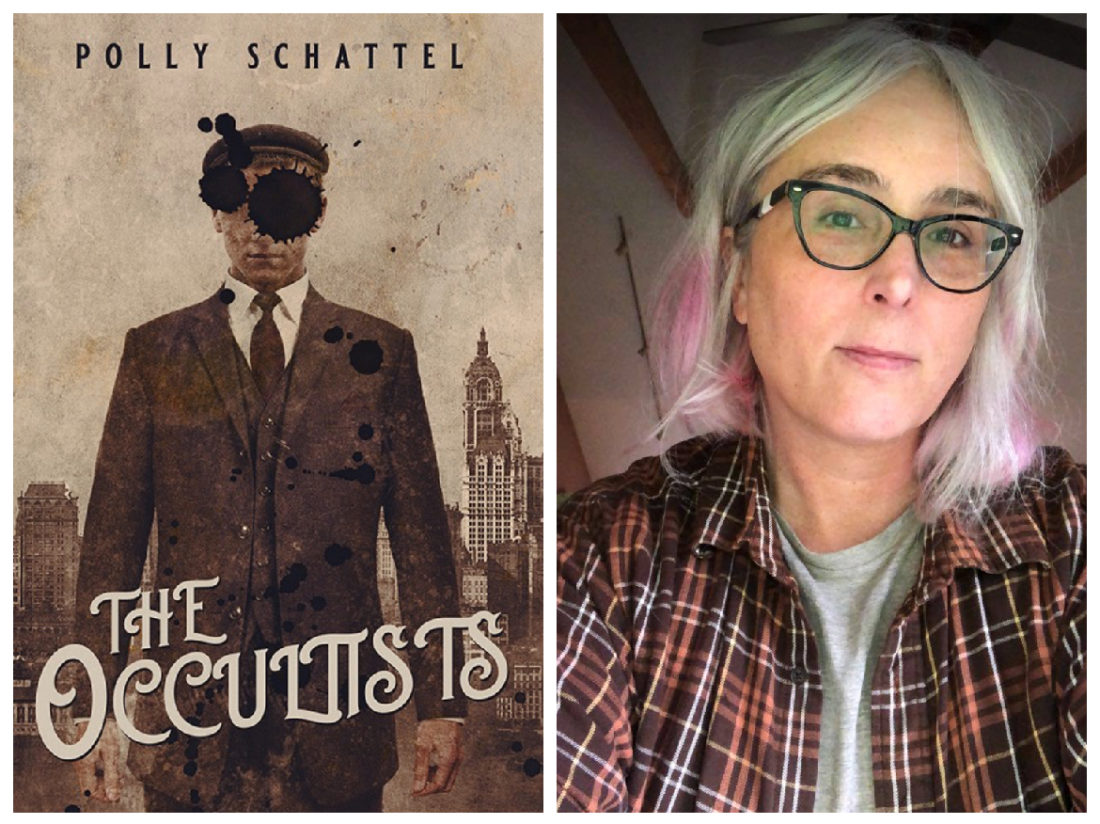Writer and filmmaker Polly Schattel had long been toying with the idea for a turn-of-the-last-century novel with themes of secret societies and hints of the occult. “These are the stories I like to write,” she says. “I grew up reading Michael Warthog and Stephen King, and fantasy and science fiction.”
She continues, “I was neck-deep in Edwardia and all the seances. … I had a feeling there were more stories from that era to tell.” So, in 2013, Schattel pitched then-Asheville-based musician Ben Lovett on a video incorporating such imagery. That haunting, Masonic Temple-set film for Lovett’s “Black Curtain” is, in a way, a precursor to Schattel’s literary print debut, The Occultists. She’ll read selections from her work at Malaprop’s on Friday, Oct. 30, as part of a horror and dark fiction event.
The novel — parts fantasy, history and horror — was published in July, and Schattel already has her next three writing projects in the works. She’s not in a hurry to return to full-time filmmaking (though her illustrious career, under her pre-transition name Paul Schattel, includes selections such as Alison and Quiet River, and the online series “Live at Moog” for Paste magazine; as Polly Schattel, she directed the short film Here There Be Tygers).
“In film, you chase million-dollar budgets for years,” Schattel says. “I was always the bridesmaid.” Multiple projects of hers were optioned — i.e., entered into contractual agreements with major studios — but never completed. She dealt with Academy Award winners. She received a call from James Spader’s agent regarding a specific project. But ultimately she feels that filmmaking is “a desperate world.”
It can be argued that The Occultists presents a desperate world, too, though Schattel felt very much at home while creating its universe. The narrative follows small-town Georgia teen Max as he’s welcomed into a secret society. But when his mentors send him to a school for young people with metaphysical abilities, he uncovers nefarious plots and rival organizations that “silence” adversaries in bids for control.
“I hadn’t realized how many tropes I was using,” Schattel says, noting such motifs as the magical school. “Hopefully I was able to do something fresh.” In fact, the novel’s deep dive into spiritualism and early 1900s America is an engaging distraction from the worries of present day. At the same time, themes of wildfire, social and political strife, as well as complex race relations feel timely.
“Sadly, abuse of power is not something that’s new. [This is a] universal theme,” Schattel says, pointing to how J.R.R. Tolkien’s Middle-earth in his Lord of the Rings books drew parallels to World War I. The idea of extermination of the “other” is also explored throughout The Occultists, as Max and his friend Harriet hide from their enemies while seeking protection and mentorship from a community of fringe characters, including a theatrical magician and revolutionary conjurer. The action takes place across the American landscape, from the Midwestern plains to New York City, as well as in the aether — a Matrix-esque plane beyond linear time.
“Film teaches you story,” Schattel says of the shift from visual narrative to the written word. The Occultists was originally envisioned for the screen, “but I didn’t have the budget.” However, literature was Schattel’s first love: She was an English major and says writing “was Plan A” before she was lured into the world of film.
Cinematic sensibility infuses The Occultists through vivid description and an array of unusual characters, such as the gruesome Moorelander, the sagelike Theodosius the Sorrowed and mentor/trickster Black Howard. Though the novel’s female-identified characters are few, they, too, are drawn in bold strokes and with plenty of nuance. Harriet curses and steals, while Madame Z— wears men’s clothing and smokes hand-rolled cigarettes.
The character of Madame Z— is based on Russian occultist Helena Petrovna Blavatsky. “If you read about Madame Blavatsky, she’s a hoot. She’s a badass,” Schattel says. “She was kooky herself, but she’s way more interesting than those patriarchal white guys.”
The real-life secret societies Schattel draws on for her fiction were “very male-dominated, very white, very patriarchal,” she notes. And she’s quick to admit that she was once part of that worldview, even as a political liberal. “The trans thing has helped me with a lot of this, too, because white men don’t even see this stuff. I can tell you, because I used to count myself among them.”
Schattel adds, “Only when you step outside of these patriarchal structures are you able to see their true sickness for what they really are. Being trans helped to open my eyes to how the ‘other’ is treated by people in power.”
The Occultist is available in bookstores. Learn more at pollyschattel.com.



Before you comment
The comments section is here to provide a platform for civil dialogue on the issues we face together as a local community. Xpress is committed to offering this platform for all voices, but when the tone of the discussion gets nasty or strays off topic, we believe many people choose not to participate. Xpress editors are determined to moderate comments to ensure a constructive interchange is maintained. All comments judged not to be in keeping with the spirit of civil discourse will be removed and repeat violators will be banned. See here for our terms of service. Thank you for being part of this effort to promote respectful discussion.